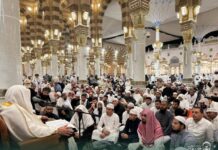By Imam Murtadha Gusau
In the Name of Allah, the Beneficent, the Merciful
All perfect praise be to Allah the Lord of the Worlds. May His peace and blessings be upon our beloved Prophet Muhammad (Peace be upon him) and upon all his family and companions. To proceed:
Dear brothers and sisters! Know that, the Day of Arafah has historical and religious significance within Islam as it commemorates several important events and milestones. Here are some key historical aspects associated with the blessed Day of Arafah:
1. Repentance of Adam and Hawwa
Adam and Hawwa, the first human beings, sought forgiveness from Allah for their disobedience and were reunited on the Day of Arafah. This event highlights the significance and importance of repentance and seeking forgiveness on this day.
2. Prophet Ibrahim (AS) and the Origins of Hajj
The Day of Arafah is connected to the story of Prophet Ibrahim (AS) and his family. It is believed that Prophet Ibrahim and his son Prophet Isma’il (AS) were instructed by Allah to build the Ka’abah, the sacred house of worship in Makkah. The Day of Arafah symbolises the culmination of their journey and their steadfastness in fulfilling the divine command.
3. Revelation of the Verse of Completion
On the Day of Arafah, in the year 10 AH (632 CE), the revelation of the final verse of the Qur’an took place. This verse, known as the Verse of Completion, was revealed to Prophet Muhammad (Peace be upon him) in the plain of Arafat. It signifies the completion of the message of Islam and the perfection of faith.
4. Farewell Sermon
The Day of Arafah marks the occasion when Prophet Muhammad (Peace be upon him) delivered his final sermon during his farewell Hajj pilgrimage in the year 632 CE. The sermon took place at the Mount of Mercy (Jabal al-Rahmah) in Arafat, where the Prophet addressed a vast gathering of Muslims. The sermon covered various aspects of faith, social responsibility, and guidance for the Muslim Ummah.
Overall, the Day of Arafah encompasses historical events related to the Prophet Muhammad (Peace be upon him) and his final sermon, the completion of the Qur’an, the origin of the Hajj pilgrimage through Prophet Ibrahim (AS), and the concept of repentance as exemplified by Adam and Hawwa. These historical elements contribute to the spiritual and historical significance of the Day of Arafah within the Islamic faith.
Respected brothers and sisters! The yearly pilgrimage of Hajj is compulsory for all Muslims. Hajj is the fifth pillar of Islam and is the nobliest time of the year in the religion of Islam. The pilgrimage has seven rites and traditions that are followed in order. The House of Allah — The Noble Ka’abah, is circulated around seven times. Next, Muslims spend a day praying on Mount Arafat, followed by an overnight stay in Muzdalifah. A ritual of throwing stones symbolising ‘stoning of the devil’ is performed, then the distance between Al-Safah and Al-Marwah is covered seven times. Lastly, the farewell Tawaf is performed in a counterclockwise direction. The Hajj rituals are much more elaborate than this, but these steps are the basics.
Those who cannot travel to Makkah for the pilgrimage spend the day intensely supplicating, praying, and fasting. The Day of Arafah carries a great spiritual reward for Muslims.
Dear servants of Allah! The Day of Arafah is significant for its emphasis on forgiveness, mercy, repentance, spiritual cleansing, unity and the culmination of the Hajj pilgrimage. It is a day of immense importance and a time for Muslims to seek closeness to Allah, seek forgiveness and reflect on their faith and actions.
It is believed that on the Day of Arafah, Allah forgives the sins of those who sincerely repent and seek forgiveness hence, Muslims around the world strive to maximise their supplications and seek mercy on this day. The Day of Arafah is seen as a golden opportunity for Muslims to purify their hearts, seek spiritual cleansing and gain closeness to Allah.
The Day of Arafah is the central day of the Hajj pilgrimage, which is one of the five pillars of Islam and the day is considered the pinnacle of the Hajj journey. Pilgrims gather in the plain of Arafat and engage in acts of worship, such as prayer, recitation of the Qur’an, supplication and reflection. Standing on the Mount of Mercy is particularly significant, as it is believed to be the place where Prophet Muhammad (Peace be upon him) delivered his final sermon. The Day of Arafah is an integral part of fulfilling the obligations of the Hajj pilgrimage.
The Day of Arafah is seen as an opportunity for spiritual cleansing and renewal and Muslims are encouraged to engage in self-reflection, introspection and repentance. It is a day to seek forgiveness, rectify one’s behaviour and make positive changes in one’s life. The day is marked by devotion, humility and a sincere commitment to personal and spiritual growth.
Arafat symbolises the unity and equality of all Muslims before Allah as pilgrims from diverse backgrounds, nationalities and social statuses come together in Arafat, dressed in the same simple attire of ihram. This gathering emphasises the oneness of the Muslim Ummah and the universal brotherhood/sisterhood in Islam. The Day of Arafah serves as a powerful reminder of the importance of unity, empathy, and compassion.
It is basically the climax of Hajj when Muslim pilgrims gather at Mount Arafat and offer a day-long prayer with recitations of the Qur’an. Since Mount Arafat is approximately 15 kilometers away from Makkah, the Muslim pilgrims spend a day there to perform the rituals and live in tents from dawn to dusk.
It was on Mount Arafat that Prophet Muhammad (Peace be upon him) gave his last sermon of Islam hence, pilgrims stand there united as a dignified ritual, to seek forgiveness through reflection and prayer and it is this moment that may be described as “standing before Allah.” While fasting on the Day of Arafah is prohibited for the pilgrims, but it is a highly recommended Sunnah for non-pilgrims as it entails a great reward with the belief that Allah forgives the sins of two years.
Since Arafah Day is viewed by Muslims as a day of gratitude, the next day is celebrated as Eid-ul-Adha which marks another sacrifice by Prophet Ibrahim. This joyous occasion marks the end of the Hajj pilgrimage and lasts for three days where Muslims worldwide commemorate Prophet Ibrahim’s (AS) willingness to sacrifice his son as an act of obedience to Allah. Eid al-Adha is a time of unity, charity, sadaqah, sharing meals and spreading happiness.
Respected brothers and sisters! The Day of Arafah fasting is highly encouraged and recommended for those not going on Hajj. The beloved Prophet Muhammad (Peace be upon him) said:
“Fasting on the Day of Arafah expiates the sins of the past year and the coming year.” [Muslim]
The Prophet Muhammad (Peace be upon him) said about the Day of Arafah Du’a:
“The most excellent Du’a is the Du’a on the Day of Arafah, and the best of what I and the Prophets before me have said is:
“لا إله إلا الله وحده لا شريك له، له الملك، وله الحمد، وهو على كل شيء قدير.”
Meaning:
“There is nothing that deserves to be worshipped in truth except Allah; he is Alone and has no partner, to Him belongs the dominion and to Him belongs all praise, and He is All-Powerful over all things.'” [Muwatta of Imam Malik]
My great people! It is a Sunnah of our beloved Prophet Muhammad (Peace be upon him) to recite the Tahlil, Takbir, and Tahmid as many times as possible on the day of Arafah and also on the days of Tashriq (11th, 12th, and 13th of Dhul-Hijjah).
Tahlil is to say, “La ilaha illal-lah.” Takbir is to say, “Allahu Akbar.” Tahmid is to say, “Alhamdulillah.” Tasbih is to say, “Subhanallah.”
And the Prophet Muhammad (Peace be upon him) said:
“On this day (Arafah day), Allah, the most Exalted, descends to the nearest heaven, and He is proud of His servants on the earth and says to those in heavens, look at My servants, they have come from far and near, with hair dishevelled and faces covered with dust, to seek my Mercy. Even if their sins are as much as the sand or the froth of the sea, I shall forgive them.”
Respected brothers and sisters! Also one of the most important religious rituals during Eid al-Adha is the sacrifice of animals (Udhiyyah), a worship that involves slaughtering designated animals as an offering to Allah. In this sermon, I will explore the meaning of sacrificial offerings, the rewards of sacrificing animals, the timing of sacrifices, criteria for choosing sacrificial animals, conditions for the one offering the sacrifice, and the impact of animal sacrifices on the individual and society. Additionally, I will discuss the religious rulings regarding animal sacrifices during Eid al-Adha.
My beloved people! A sacrificial offering, refers to the slaughtering of camels, cattle, or sheep by Muslims on the Day of Sacrifice, which is the blessed day of Eid al-Adha and the following three days known as the Days of Tashriq. Muslims may not perform the sacrifice themselves but can delegate a specialised person to do so for them.
Sacrificial offerings are a recommended act of Sunnah Mu’akkadah, although some Islamic scholars viewed it as obligatory (Wajib). Prophet Muhammad (Peace be upon him) used to perform this act every year by sacrificing two sheep in good health conditions, with one being offered on behalf of himself and his family, and the other being offered on behalf of those who believe in Islam and Prophet Muhammad (Peace be upon him).
This practice was his annual tradition, sacrificing two sheep, and from the sheep category. It is a confirmed Sunnah when there is the ability to do so. A person may offer a sacrifice on behalf of themselves, their family, their spouse, and parents. According to some Islamic scholars it is not obligatory but is recommended when the means are available. If a person sacrifices more, it is permissible, and if someone is unable, there is no obligation. It is a confirmed Sunnah with the capacity to do so, and it carries great rewards in both this life and the hereafter.
Drawing near to Allah and sacrificing for His sake are considered among the greatest acts of worship (Ibadah). The act of sacrificing animals, in particular, is one of these noble acts. In the Qur’an, Allah Almighty says:
“Their meat will not reach Allah, nor will their blood, but what reaches Him is piety from you.” [Surah Al-Hajj: 37]
This implies that the importance lies not in the meat reaching Allah but in the purity of hearts and sincere intentions to draw closer to Allah.
The days designated for sacrificial offerings are four days: Eid al-Adha and the three days that follow, known as the Three Days of Tashriq (Eid days). The specific time for sacrifice begins immediately after the Eid al-Adha prayer and ends with the sunset of the third day of Tashriq. It is not valid to slaughter any animal intended for sacrifice after this period.
Regarding the criteria for selecting sacrificial animals, it is crucial that the animals offered as sacrifices are healthy and free from apparent defects, such as disabilities or severe illnesses. It is preferable for sacrificial animals to belong to well-known and reputable species like cows, camels, sheep, and goats. Additionally, sacrificial animals are advised to be in the best physical and mental condition to ensure quality and excellence in worship.
Dear servants of Allah! The following conditions must be met for the sacrifice to be valid:
1. Legal Ownership: The one offering the sacrifice must own it legally, and ownership through theft, forbidden wealth, or an invalid contract is not permissible.
2. Intention (Niyyah): The intention distinguishes the sacrificial offering for the sake of closeness to Allah from slaughtering animals for other purposes.
3. Free from Defects: The sacrificial animal must be free from defects and diseases. It should not be blind, lame, emaciated, unable to walk, or missing teeth.
4. Age of the Animal: The minimum age for sacrificial animals is one year if they are sheep, with an exception for sheep aged between 6 – 12 months that are strong, fat, and healthy enough to appear as if they are one year old.
The agreed-upon conditions for the one offering the sacrifice are as follows:
1. Islam: Non-Muslims are not obligated to offer sacrifices.
2. Sanity: Muslims who are not sane are not obligated to offer sacrifices.
3. Freedom: Muslim slaves who are sane are not obligated to offer sacrifices.
4. Financial Capability: Scholars differ on defining the criteria for financial capability. The Malikiyyah School believes it is the price of the sacrifice, provided the Muslim does not need it. The Hanbaliyyah School holds that the capable person is one who can obtain the price of the sacrifice, even if borrowed, as long as they are aware of their ability to repay the debt.
It is worth noting that there are various debated conditions for the one offering the sacrifice.
4. Puberty (Bulugh): The Shafi’iyyah School considers puberty a condition for the one offering the sacrifice, while the Malikiyyah School does not consider it a condition.
5. Not Being in a State of Hajj (Pilgrimage): The Malikiyyah School stipulates that the one offering the sacrifice should not be in a state of Hajj to ease the burden on the pilgrim. However, other schools of thought do not require this condition.
Respected brothers and sisters! Delegating the act of slaughter is permissible for a Muslim according to all schools of thought except the Malikiyyah School, which prohibits non-Muslims from performing the sacrifice. It is forbidden to compensate the one performing the slaughter by giving them a portion of the sacrifice’s meat or skin. Still, it is permissible to offer a portion of the sacrifice as a gift after paying the agreed-upon fee for their service.
In cases where one cannot perform the sacrifice themselves, or due to busyness or lack of expertise, delegation for sacrificing is a common practice. This delegation includes buying the sacrificial animal, slaughtering it, and distributing its meat.
Many Muslims also opt to delegate a reliable entity for sacrifices, especially if they reside in a non-Muslim country.
Regarding the impact of sacrificial offerings on the individual and society, it is significant and multi-faceted. On an individual level, the act of sacrificing enhances religious awareness and connection with Allah, reminding Muslims of Prophet Ibrahim’s sacrifice and his test of dedication and obedience to Allah.
This practice also strengthens familial and social bonds, as individuals participate in preparing and distributing sacrifices to relatives, neighbours, and those in need, fostering a spirit of mutual support and cooperation in the Ummah.
On a societal level, the process of sacrificing contributes to improving living conditions for the poor and needy. Distributing meat and other products from sacrifices is considered a social obligation and is generally well received by the Ummah. While Muslims express their closeness to Allah, the poor and needy benefit from these essential food items, contributing to meeting their basic needs.
In summary, the blessed Eid al-Adha and the sacrificial process provide an opportunity for Muslims to connect with Allah and sacrifice for His sake. This worship enhances individual religious and spiritual values and promotes social interaction and solidarity within the Ummah.
It also provides an opportunity for the poor and needy to meet their nutritional needs. It is essential to emphasise the importance of respecting religious norms and guidelines related to sacrificing animals, ensuring that it is done in a good manner and in accordance with Islamic law. The distribution of sacrifices should be done with good intentions, balancing the rights of families with the rights of the poor and needy while maintaining justice and fairness in distribution.
Dear brothers and sisters! Remember, today we have only one week to Eid-ul-Adha. Please support the orphans with your sadaqah, help them with your donations and assist them with your Zakat so that they celebrate Eid-ul-Adha happily.
For those respected brothers and sisters who want to donate to orphans, to Islamic projects and activities FISABILILLAH, those who want to send their Sadaqah and Zakat, here are the bank account details:
1. Account number: 0048647196.
– Account name: Murtala Muhammed.
– GTBank
Or:
2. Account number: 1779691620
– Account name: Murtala Muhammed.
– Access Bank.
Allah Almighty says:
“Verily, Allah will help those who help His cause. Truly, Allah is All-Strong, All-Mighty.” [Qur’an]
Jazakumullah Khairan as you kindly assit, help, donate and contribute to the cause of Allah, the cause of Islam.
May Allah Almighty accept your sacrifices, amplify your intentions, and bless you, your families with peace and barakah.
Ya Allah, grant us the best of today Jumu’ah, the best of tomorrow, the best of the Day of Arafah, and the best of our future days on earth.
Ya Allah, destroy every evil plan against us and our families.
Ya Allah, answer all our prayers and put us amongst those with successful end.
Ya Allah protect us all, protect our relatives and our beloved ones.
Ya Allah help us to obey Your command and orders, to remain obedient to You, and to follow the example of Your Prophet Muhammad (Peace be upon him).
Ya Allah grant us Your love, Your grace and Your generosity.
Ya Allah pray upon Your Prophet and Messenger Muhammad, his family and his companions. Ameen Ya Hayyu Ya Qayyum!
All praise is due to Allah, the Lord of the worlds. Prayers, peace and mercy are upon our beloved master, Muhammad, the son of Abdullah (Peace be upon him), his family and Companions.
Murtadha Muhammad Gusau is the Chief Imam of Nagazi-Uvete Jumu’ah and the late Alhaji Abdur-Rahman Okene’s Mosques, Okene, Kogi State, Nigeria. He can be reached via: gusauimam@gmail.com or +2348038289761.
This Jumu’ah Khutbah (Friday sermon) was prepared for delivery today, Friday, Dhul-Hijjah 03, 1446 AH (May 30, 2025).























